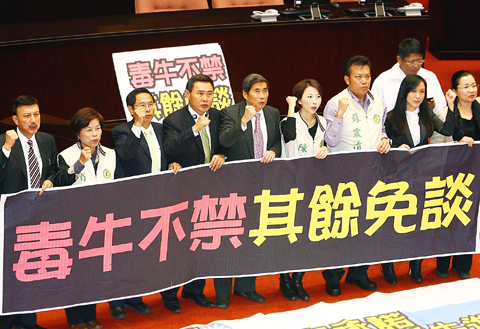Chinese Nationalist Party (KMT) caucus whip Lu Hsueh-chang (呂學樟) said yesterday that the caucus would file a lawsuit against a student who publicized the cellphone numbers of some KMT lawmakers and asked the public to lodge complaints against the government’s lifting of a ban on US beef.
Chu Cheng-chi (朱政麒), a student at National Taiwan University’s Department of Sociology who became known after uploading a video of himself eating cow excrement in protest of the government’s relaxation of restrictions of US beef products, publicized the numbers of the KMT lawmakers who supported the amendment to the Act Governing Food Sanitation (食品衛生管理法) proposed by KMT Legislator Kung Wen-chi (孔文吉).
Chu encouraged the public to call the lawmakers to tell them to withdraw their signatures from Kung’s version, which he said was to open the country to US beef and beef products without restrictions.

PHOTO: FANG PIN-CHAO, TAIPEI TIMES
“Many lawmakers received harassing phone calls and messages after Chu publicized the numbers. The complaint is in place. We will take legal action against Chu,” Lu said.
The government supported a version of the Act that would provide administrative means to block US ground beef and intestines from entering the country, while the Democratic Progressive Party (DPP) proposed a statutory ban on the products.
Kung’s version, however, adopted a loose position on the matter. While the DPP suggested a ban on imports of risky beef from areas infected with mad cow disease, Kung proposed that the ban be lifted on cattle from areas where risks of mad cow disease are under control.
His version opposed detailing the products in the Act, while authorizing the government to decide which products should be prohibited.
Because of a lack of consensus on revisions to the Act, the legislative session, which was scheduled to review bills, remained idle the whole day.
Legislative Speaker Wang Jin-pyng (王金平) later criticized the DPP caucus over its continued boycott of legislative sessions to screen amendments to the laws governing beef imports.
Wang called on the DPP “not to overdo it” and instead to help restore order in the legislature.
Meanwhile, civic groups submitted 130,459 signatures to the Central Election Commission (CEC) yesterday in an effort to initiate a referendum on the import of US beef products.
To date, more than 200,000 signatures have been collected in the campaign, which aims to force a reopening of talks between Taipei and Washington on US beef imports, said Hsieh Tien-jen (謝天仁), chairman of the Consumers’ Foundation, which is leading the drive.
The 130,459 signatures that have been submitted to the CEC by far exceed the requirements for the first threshold of a referendum initiative, Hsieh said.
The first step in the process requires at least 86,000 signatures — 0.5 percent of the country’s 17.32 million registered voters in the last presidential election.
“The remaining 70,000 signatures will be kept for the second stage,” Hsieh said.
Under the Referendum Act (公民投票法), once a screening committee finds that the proposed referendum conforms to the legal guidelines, the next step for the referendum’s sponsors is to obtain the endorsement of at least 5 percent of the electorate — in this case 860,000 signatures.
CEC Secretary-General Teng Tien-you (鄧天祐) said the commission would determine by Friday whether the referendum initiative meets the terms of the regulations.
The commission will then submit the proposal to the Executive Yuan Referendum Screening Committee for confirmation, Teng said.

Taiwanese can file complaints with the Tourism Administration to report travel agencies if their activities caused termination of a person’s citizenship, Mainland Affairs Council Minister Chiu Chui-cheng (邱垂正) said yesterday, after a podcaster highlighted a case in which a person’s citizenship was canceled for receiving a single-use Chinese passport to enter Russia. The council is aware of incidents in which people who signed up through Chinese travel agencies for tours of Russia were told they could obtain Russian visas and fast-track border clearance, Chiu told reporters on the sidelines of an event in Taipei. However, the travel agencies actually applied

New measures aimed at making Taiwan more attractive to foreign professionals came into effect this month, the National Development Council said yesterday. Among the changes, international students at Taiwanese universities would be able to work in Taiwan without a work permit in the two years after they graduate, explainer materials provided by the council said. In addition, foreign nationals who graduated from one of the world’s top 200 universities within the past five years can also apply for a two-year open work permit. Previously, those graduates would have needed to apply for a work permit using point-based criteria or have a Taiwanese company

The Shilin District Prosecutors’ Office yesterday indicted two Taiwanese and issued a wanted notice for Pete Liu (劉作虎), founder of Shenzhen-based smartphone manufacturer OnePlus Technology Co (萬普拉斯科技), for allegedly contravening the Act Governing Relations Between the People of the Taiwan Area and the Mainland Area (臺灣地區與大陸地區人民關係條例) by poaching 70 engineers in Taiwan. Liu allegedly traveled to Taiwan at the end of 2014 and met with a Taiwanese man surnamed Lin (林) to discuss establishing a mobile software research and development (R&D) team in Taiwan, prosecutors said. Without approval from the government, Lin, following Liu’s instructions, recruited more than 70 software

Taiwanese singer Jay Chou (周杰倫) plans to take to the courts of the Australian Open for the first time as a competitor in the high-stakes 1 Point Slam. The Australian Open yesterday afternoon announced the news on its official Instagram account, welcoming Chou — who celebrates his 47th birthday on Sunday — to the star-studded lineup of the tournament’s signature warm-up event. “From being the King of Mandarin Pop filling stadiums with his music to being Kato from The Green Hornet and now shifting focus to being a dedicated tennis player — welcome @jaychou to the 1 Point Slam and #AusOpen,” the